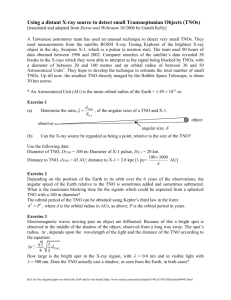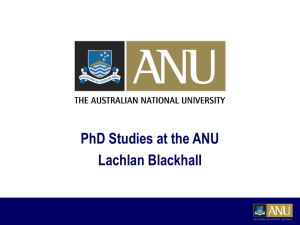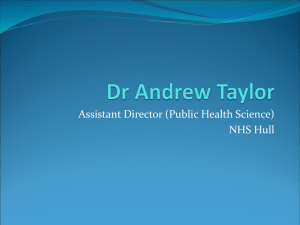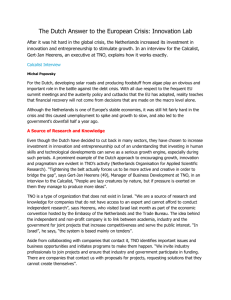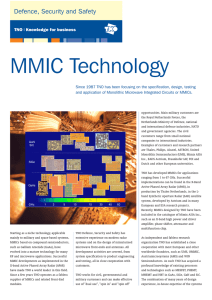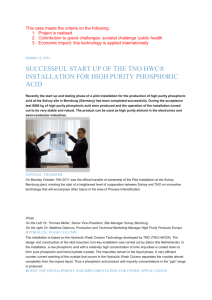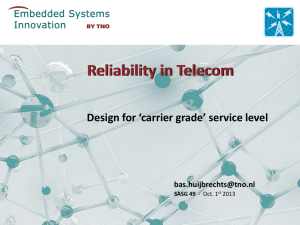PhD Social Conventions Learning in Mixed Reality
advertisement
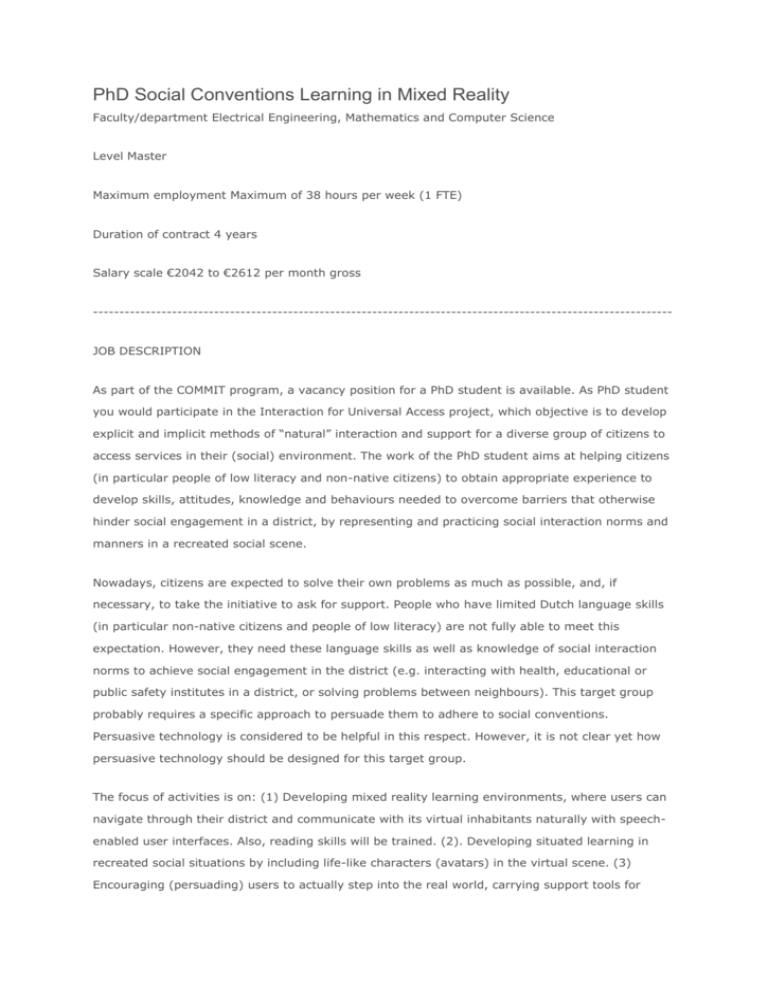
PhD Social Conventions Learning in Mixed Reality Faculty/department Electrical Engineering, Mathematics and Computer Science Level Master Maximum employment Maximum of 38 hours per week (1 FTE) Duration of contract 4 years Salary scale €2042 to €2612 per month gross -------------------------------------------------------------------------------------------------------------JOB DESCRIPTION As part of the COMMIT program, a vacancy position for a PhD student is available. As PhD student you would participate in the Interaction for Universal Access project, which objective is to develop explicit and implicit methods of “natural” interaction and support for a diverse group of citizens to access services in their (social) environment. The work of the PhD student aims at helping citizens (in particular people of low literacy and non-native citizens) to obtain appropriate experience to develop skills, attitudes, knowledge and behaviours needed to overcome barriers that otherwise hinder social engagement in a district, by representing and practicing social interaction norms and manners in a recreated social scene. Nowadays, citizens are expected to solve their own problems as much as possible, and, if necessary, to take the initiative to ask for support. People who have limited Dutch language skills (in particular non-native citizens and people of low literacy) are not fully able to meet this expectation. However, they need these language skills as well as knowledge of social interaction norms to achieve social engagement in the district (e.g. interacting with health, educational or public safety institutes in a district, or solving problems between neighbours). This target group probably requires a specific approach to persuade them to adhere to social conventions. Persuasive technology is considered to be helpful in this respect. However, it is not clear yet how persuasive technology should be designed for this target group. The focus of activities is on: (1) Developing mixed reality learning environments, where users can navigate through their district and communicate with its virtual inhabitants naturally with speechenabled user interfaces. Also, reading skills will be trained. (2). Developing situated learning in recreated social situations by including life-like characters (avatars) in the virtual scene. (3) Encouraging (persuading) users to actually step into the real world, carrying support tools for applying the skills developed in the virtual world with them. This will be achieved by performing an inclusive design process with representatives of the target group to obtain user needs, requirements and to evaluate the learning environment. Research questions are: (1) How can social interaction norms and manners—that help citizens to overcome barriers that otherwise hinder social engagement in a district (e.g. interacting with health, educational or public safety institutes in a district) — be represented in a recreated social scene to obtain appropriate experience and skills, attitudes, knowledge and behaviours? (2) How can life-like characters (avatars) in the virtual scene stimulate situated learning? (3) Can users be stimulated in the virtual world to step into the real world, carrying mobile support tools? (4) How should persuasive technology be designed for the target group of people of low literacy and nonnative citizens? REQUIREMENTS The work will apply a situated cognitive engineering approach, i.e. scenario- and claim-based analysis, iterative development cycles of prototypes, focus group reviews, and empirical evaluations of prototypes. Your responsibilities include developing several working prototypes of the learning environment with personal assistance, and conducting the evaluations. You have a university Master degree in the area of human-technology interaction, cognitive psychology, cognitive science or artificial intelligence. Your performance in the Master programme can be classified as excellent. Experience with software development for Virtual Reality and/or Personal Assistance is an added value. You are comfortable with user-centered design, in particular involving our target group. You will publish in renowned journals and present the research at international congresses. The work will lead to a PhD under the supervision of Prof.dr. M.A. Neerincx, dr. A.H.M. Cremers and dr. J.M. Kessens. The PhD student's main base of operation will be at TNO Soesterberg. CONDITIONS OF EMPLOYMENT TU Delft offers an attractive benefits package, including a flexible work week, free high-speed Internet access from home (with a contract of two years or longer), and the option of assembling a customised compensation and benefits package (the 'IKA'). Salary and benefits are in accordance with the Collective Labour Agreement for Dutch Universities. ELECTRICAL ENGINEERING, MATHEMATICS AND COMPUTER SCIENCE The Faculty of Electrical Engineering, Mathematics and Computer Science (EEMCS) is known worldwide for its high academic quality and the social relevance of its research programmes. The faculty’s excellent facilities accentuate its international position in teaching and research. The faculty offers an interdisciplinary setting for its 500 employees, 350 PhD students and 1700 undergraduates. Together they work on a broad range of technical innovations in the fields of sustainable energy, telecommunications, microelectronics, embedded systems, computer and software engineering, interactive multimedia and applied mathematics. EEMCS: Your Connection to the Future. The Department of Mediamatics comprises the media-oriented computer science groups in the Faculty of EEMCS and is responsible for a major part of the Bachelor and Master programmes in Computer Science. The department’s mission is to be internationally recognised for its excellent researchers in the field of data processing and interpretation using model- and knowledge-based algorithms. The department aims thus to enable man and machine, in close cooperation with their intelligent environment, to deal with ever increasing information flows. Within the Department of Mediamatics, the mission of the Man-Machine Interaction Group is to engineer adaptive, intelligent systems to create intended user experiences. TNO The PhD student's main base of operation will be at TNO Soesterberg. TNO is an independent, notfor-profit, body with a public mission. TNO is primarily concerned with the application of knowledge to improve the competitiveness of companies and to assist governments with policy matters. TNO Soesterberg, is one of the main human factors laboratories worldwide. Its mission is to optimize human performance in complex and demanding environments. Its multidisciplinary staff includes psychologists, interaction designers, engineers, and physicists. It has extensive, advanced tools and facilities for human-in-the-loop testing with low and high fidelity prototypes or simulations in the lab or (remote) location. INFORMATION AND APPLICATION For more information about these positions, please contact Prof. Dr. M. A. Neerincx, (mark.neerincx@tno.nl); Dr. A.H.M. Cremers, (anita.cremers@tno.nl); or Dr.ir. W.-P. Brinkman (w.p.brinkman@tudelft.nl). To apply, please submit the following application materials: (1) Curriculum Vitae including contact details of references. (2) Course lists with grades. (3) A letter of application in which you explain both your interest and the relevance of your skills and experience in the context of this research project. At this stage, please do NOT submit papers or theses that you might have written. You may submit your materials either by post to Ms. J. Eddini, Mekelweg 4, 2628 CD Delft, The Netherlands; or by e-mail to hr-eemcs@tudelft.nl. Please send your application by 13th April 2012. When applying for this position, please refer to vacancy number EWI2011-18.


